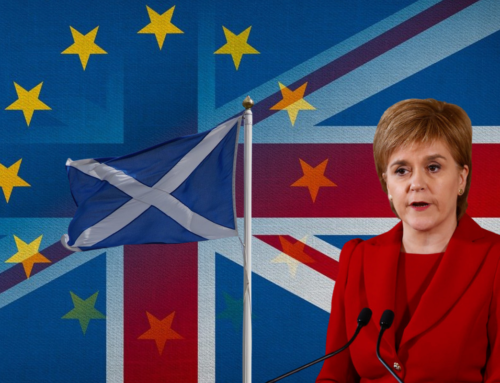
by Brendan Donnelly
Director, The Federal Trust
12th August 2019
The arrival of Boris Johnson in Downing Street and the impending Article 50 deadline of 31st October have given a new sense of urgency to political players and observers, particularly among those opposed to Brexit. Specifically, it is increasingly accepted that if Boris Johnson is still Prime Minister on 31st October the UK will leave the EU without a Withdrawal Agreement; and that the most obvious way of preventing this will be to replace his government with another one. The hope has not been entirely abandoned that it may be possible by Parliamentary guerrilla warfare to prevent Johnson and his colleagues from crashing out of the EU with “no deal” at Halloween. But the political focus has now shifted towards the possibility of a Government of National Unity to seek at the very least an extension of the deadline for Brexit, a deadline which Johnson has staked his entire political credibility on meeting.
The Labour Party has strongly hinted that it will be initiating a vote of no confidence in the Johnson government when Parliament reconvenes in early September. It is not entirely clear whether this vote will be formulated in the terms required to trigger the terms of the Fixed Term Parliaments Act (FTPA), or whether it will be more broadly phrased. Losing such a vote would in either case place immediate and immense political pressure upon Mr Johnson to resign as Prime Minister. It has been suggested from his entourage that in either case he would resist such pressure. He will argue that the Conservative Party is by a long way the largest Party in the House of Commons and that no alternative administration, given the heterogeneity of its possible makeup, offers as good a prospect of stable government as does the continuation of his administration. The crucial question of British politics over the coming month is whether the various cross-party forces opposed to the Johnson government can demonstrate among themselves sufficient coherence and co-ordination as to provide, notably in the estimation of the Queen, a plausible contradiction of this latter argument. First signals have been mixed.
Soon after Parliament rose for its summer recess a number of reports began circulating of conversations between disaffected Conservatives and senior Labour figures to consider joint action against a “no deal” Brexit. An element in these conversations was supposedly the possibility of a Government of National Unity (GNU), headed by a Labour Prime Minister other than Jeremy Corbyn, or perhaps even by a Conservative such as Ken Clarke. If a significant minority of Conservative MPs, provoked by what they see as the recklessness of the Johnson government, were prepared to back such a GNU, and all the other non-Conservative parties were willing to offer support, there seemed then to be a real prospect emerging of a viable alternative to the present Conservative government. Central to this prospect was the supposed willingness of Jeremy Corbyn to stand aside as Prime Minister for a less contentious figure, thus making it easier for disaffected Conservatives and MPs from other parties to support the GNU.
No throwaway remark
It now appears, however, from comments of the close Corbyn ally, John McDonnell, that such willingness is far from certain. In comments during an interview with the right-wing commentator Iain Dale, Mr McDonnell made clear that the Labour leadership’s collective view of an alternative administration was exclusively that of a Labour government, headed by Corbyn, enjoying support but no more from other parties such as the SNP. He went so far in his interview as to suggest that as the leader of the Opposition Mr Corbyn had the automatic right to become Prime Minister when the sitting government lost a vote of confidence. This maximalist claim, if maintained, would make the formation of any alternative government to Boris Johnson’s difficult, probably impossible.
It may be that Mr McDonnell’s remarks were simply intended as a warning to Labour colleagues that he and Mr Corbyn should not be taken for granted as plans emerge for a cross-Party government in which Labour would be the leading component. They may show themselves as more flexible in practice over the coming weeks as events unroll in ways that are not now entirely predictable. There will, however, be some, not least among anti-Brexit Labour MPs, who fear that the intransigence of Mr Corbyn and his supporters will be the rock on which the prospect of a national government founders. A Corbyn-led government will struggle to recruit in its support even a handful of Conservative MPs and the new Liberal Democrat leader Jo Swinson has ruled out any Parliamentary pact with him. Others even suspect that a “no deal” Brexit will be an outcome which Mr Corbyn might find congenial. He might well relish an election later in the year during which he and his Party could firmly pin upon the Conservative Party responsibility for the economic disruption of leaving the EU without a Withdrawal Agreement.
Another uncertainty in the construction of a national government would be its proposed agenda, on which agreement will also be very challenging. Many, but not all Labour MPs, would see the principal task of such a GNU as being the holding of a new European referendum with “remain” as an option supported by their party. Interestingly, a number of those Conservative MPs most hostile to Mr Johnson would also favour such a central policy for the new administration. But a significant minority among Labour MPs is hostile to a new referendum in any event, while Mr Corbyn himself has come to accept the need for one, but he has not committed himself to campaigning for “remain” in all circumstances . He and his Labour supporters have as their favoured outcome a postponement of the Brexit deadline of 31st October, followed by a General Election later in the year. A Labour government resulting from this election would then engage in further Brexit-related negotiations with the EU, the result of which would then be put to a referendum. There are many Labour MPs who have severe doubts about the desirability or winnability of a General Election fought under Mr Corbyn’s leadership and advocating such an equivocal European policy. Nor would all the Conservatives who might be prepared to vote down the Johnson government be happy at the prospect of a rapid General Election that might terminate their political careers.
No sure alternative
It will be apparent from the above that the construction of an alternative administration to Boris Johnson’s will be no easy task. If this construction fails, then the implications will be profound for the consequences of a “no confidence vote” in early September. If that vote is not phrased in the precise terms of the FTPA, Johnson will probably seek to carry on his government, at least until 31st October. He might well succeed. It would be a bold move indeed for the Queen to dismiss him without any plausible alternative in sight. If on the other hand the “no confidence” vote is carried out in accordance with the terms of the FTPA, Johnson will almost certainly find himself fourteen days later obliged to recommend to the Queen, because no alternative government can be formed, the date of the next General Election. His office has suggested that this recommended date should be after Brexit has taken place, possibly on 1st November.
If a “no confidence” vote outside the terms of the FTPA would put the Queen in a constitutionally difficult position, such a recommendation to hold the next General Election on 1st November would render her constitutional position impossible. The overwhelming reason why Parliament would have voted “no confidence” in the Johnson government would have been its hostility to a “no deal” Brexit. For her then to acquiesce in an electoral date which circumvents this hostility and allows “no deal” Brexit to occur would be a profoundly and controversially political choice on her part. On the other hand, to refuse the recommended date of her Prime Minister for the next election on clearly political rather than administrative grounds, would be a step into the political arena that no monarch has taken since the 1930s, when George V played a decisive role in the formation of the National Government. Nobody can predict what the outcome of such an impossible dilemma for the British head of state might be.
Shrinking options
If a GNU can replace the Johnson administration in early September, it will create political space for that new government to seek an extension of the Article 50 deadline, for a referendum, for a general election in due course, for revocation of the Article 50 notification or further negotiation with the EU, particularly of the Political Agreement. If no GNU emerges options against the Johnson government rapidly shrink. This new government has already made clear that it will use all its political and administrative resources to assert its dominance over Parliament and the political discourse on Brexit in general. Parliamentary manoeuvring in October by anti-Brexit forces runs the risk of being too little, too late against a ruthless and ideologically driven administration. The progress or otherwise of cross-party talks over what remains of the summer will shape decisively the course of events in the next two months.
In all the welter of uncertainty surrounding the formation of a cross-party government two issues are likely to be decisive: the role of Mr Corbyn and the mission of the new government . If Mr Corbyn insists on being Prime Minister of a purely Labour government, or even of a coalition government, then it will be impossible to construct a stable anti-Johnson majority. The thirty or forty Conservative MPs who might participate in this majority would simply refuse to do so for his benefit. These same Conservatives would be similarly reluctant to support any cross-party government without a precise European agenda, most probably that of holding a referendum with an option to “remain.” They will not wish to sustain an administration vaguely hoping that it can do better than Theresa May and Mr Johnson at “managing” Brexit. Although some of these Conservative MPs will be reluctant to say so publicly, most of them recognise that their party’s difficulties over the past three years are intrinsic to the whole Brexit project and that reasonable “management” of Brexit is simply a chimera.
Over the weekend the Queen was quoted in the Sunday Times as supposedly believing that the present generation of British politicians are “incapable of governing.” If that is indeed her belief, then these same politicians have the clear opportunity to prove her wrong over the coming weeks. There is a substantial majority within the Commons rightly horrified at the prospect of a “no deal” Brexit. It would be a calamitous failure, not merely of current British politicians, but of the British political system more broadly, if that majority found itself unable to prevent a foreseeable and avoidable national catastrophe. The most obvious and reliable path to prevention lies through a cross-Party government, established in early September. Among advocates of Brexit, World War 2 parallels are much in vogue. It would be a pleasing irony if the current Brexit crisis generated a coalition government headed by a Conservative without a majority within his own party, but crucially dependent upon support from the Labour Party. The lessons and examples of history are frequently capable of diametrically opposing interpretations. Ken Clarke may still turn out to be the Churchill of 2019. Auditions for the role of Clem Attlee in this historical recreation are still proceeding.






